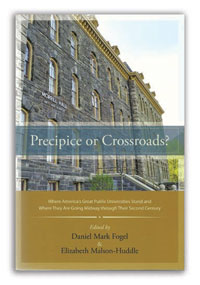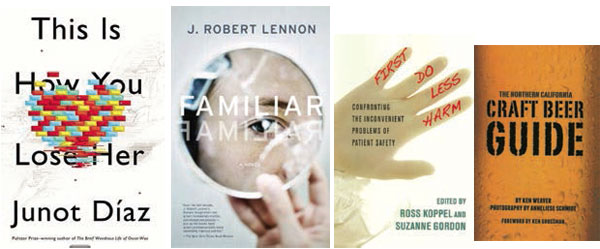Precipice or Crossroads? edited by Daniel Mark Fogel '69, MFA '74, PhD '76 & Elizabeth Malson-Huddle (SUNY)
Precipice or Crossroads?
edited by Daniel Mark Fogel '69, MFA '74, PhD '76 & Elizabeth Malson-Huddle (SUNY)
A merican land-grant universities—once the nation's most important source for innovation, problem solving, and economic competitiveness—are at risk from reduced public funding and rising tuition. "Our great public universities are under threat, and some would say they are facing their hour of maximum peril," writes Fogel, former president of the University of Vermont. "Can the nation remain prosperous, strong, and healthy if these critical institutions have been sent careening toward a cliff edge, and can that hair-raising course be changed?"
merican land-grant universities—once the nation's most important source for innovation, problem solving, and economic competitiveness—are at risk from reduced public funding and rising tuition. "Our great public universities are under threat, and some would say they are facing their hour of maximum peril," writes Fogel, former president of the University of Vermont. "Can the nation remain prosperous, strong, and healthy if these critical institutions have been sent careening toward a cliff edge, and can that hair-raising course be changed?"

This Is How You Lose Her by Junot Díaz, MFA '95 (Riverhead). Díaz, who won the 2008 Pulitzer Prize for his first novel, The Brief Wondrous Life of Oscar Wao, explores the themes of love, desire, infidelity, and obsession in his second collection of short stories. His recurring character, Yunior, says, "I'm like everybody else: weak, full of mistakes, but basically good." Yet his outward honesty doesn't keep him from cheating, and he struggles toward a more authentic self. In the aftermath of a bad breakup, Yunior turns to writing and learns that "the half-life of love is forever."
Familiar by J. Robert Lennon (Graywolf). Every year, Elisa Brown drives to Wisconsin to visit her son Silas's grave, but this time her life undergoes a tectonic shift. She notices the crack in the windshield is gone, she's wearing new clothes, and she's driving a new car. Her house is different. Her other son, Sam, behaves oddly. Even her husband is kinder and more attentive. Weirdest of all, Silas never died in a car accident. Elisa feels lost in this altered life and wonders if she's dragged the rest of the world into a dream where her son is still alive.
First, Do Less Harm edited by Ross Koppel and Suzanne Gordon '67 (Cornell). Despite the best efforts of health-care workers and managers, patient safety is an ongoing problem. Misdiagnoses, lost tests, prescription errors, lack of training in complex technology, hospital-acquired infections, software bugs in electronic records, and lack of teamwork cost thousands of lives and billions of dollars each year in the U.S. In this collection of essays, physicians, nurses, researchers, and patients highlight issues of fatigue, hospital hygiene, excessive workloads, and risky cost-cutting measures and explore why patient safety is advancing at such a slow pace.
The Northern California Craft Beer Guide by Ken Weaver, MS '05, photography by Anneliese Schmidt, MS '05 (Cameron + Company). By the end of the Seventies, there were fewer than fifty breweries in America, down from 1,700 in 1900. Since then the beer industry has transformed itself from a producer of bland lagers to a maker of fine craft beers. This handbook breaks down the territory into eight regions and includes top beer suggestions, style discussions, an event calendar, and information on breweries, beer bars, restaurants, and bottle and homebrew shops.
Poetry
A Thousand Doors by Matt Pasca '95 (JB Stillwater). Inspired by a Buddhist parable about grief and healing, Pasca explores the fine line between trauma and wonder.
Natural Selections by Joseph Campana, PhD '03 (Iowa). A professor of Renaissance literature at Rice University won the 2011 Iowa Poetry Prize with this second collection of poems.
Fiction
The Calypso Directive by Brian Andrews, MBA '03 (Arcade). An unscrupulous pharmaceutical company holds Will Foster in quarantine, planning to use his DNA, which carries immunity to most diseases, to create a lucrative gene therapy. Will escapes and tries to discover the truth and elude his pursuers in this debut thriller.
The Madman Theory by Harvey Simon '76 (Rosemoor). What if Richard Nixon had been elected president in 1960 instead of John F. Kennedy? In his first novel, a former national security analyst speculates how Nixon might have responded to the Cuban Missile Crisis of 1962.
The Rescuer's Path by Paula Friedman '60 (Plain View). Malca Bernovski can't forget the events of the early Seventies: her lover, Gavin, an antiwar activist, was shot dead and she gave up their baby for adoption. Thirty years later, when Malca, now middle-aged and married, receives a call from her daughter, both women must learn to heal the wounds of the past and open themselves to a new future.
Coming Flu by J. L. Greger, PhD '73 (Oak Tree). When a new strain of flu kills more than two hundred people in a gated community near Albuquerque, epidemiologist Sara Almquist must combat the double danger of the epidemic and a drug kingpin.
Non-Fiction
The China Fallacy by Donald Gross '74 (Bloomsbury). A policy expert and former State Department official challenges current China policy, which sees the country as a future threat. He questions America's increased military presence in the Asia-Pacific and argues that eliminating trade barriers would bring greater prosperity to the U.S. and strengthen human rights and democracy in China.
Ithaca by Mary Williams '97 (Arcadia). The Images of America series looks back at Ithaca's past—its people, landscape, architecture, organizations, and activities—in photographs selected from the History Center in Tompkins County.
Drinking Diaries edited by Leah Odze Epstein '88 & Caren Osten Gerszberg (Seal). "Whether our drinking is a choice or compulsion, people rarely talk about its quotidian existence," write the editors of this collection of personal stories about the role of alcohol in women's lives.
People of the Water by Joseph W. Bastien, PhD '73 (Utah). The Uru-Chapayans, a people of the Bolivian Andes, were reduced to 400 members by 1940, but their population has rebounded in recent years. A professor of sociology and anthropology at the University of Texas, Arlington, examines how they have maintained their culture against the forces of modernity.
The Legacy of David Foster Wallace edited by Samuel Cohen and Lee Konstantinou '00 (Iowa). The editors gather critical essays, interviews, and reminiscences of the late novelist by Rick Moody, Dave Eggers, Jonathan Franzen, and other contemporary writers.
The Lettered Mountain by Frank Salomon, PhD '78, and Mercedes Niño-Murcia (Duke). A professor emeritus of anthropology at the University of Wisconsin and his colleague analyze the history of literacy among rural Peruvian Indians.
Land and Loyalty by Tomas Larsson, MA '04 (Cornell). A lecturer in politics and international studies at the University of Cambridge explores Thailand's record of development and property rights.
Warrior Ways edited by Eric Eliason and Tad Tuleja, MA '68 (Utah State). An exploration of American military folklore, from marching cadences to slang, humor, and music.


